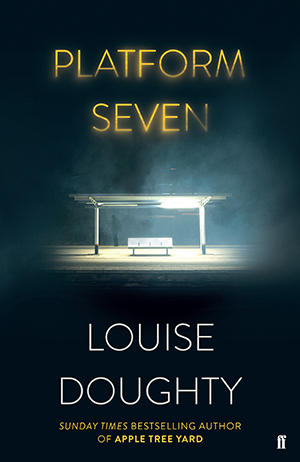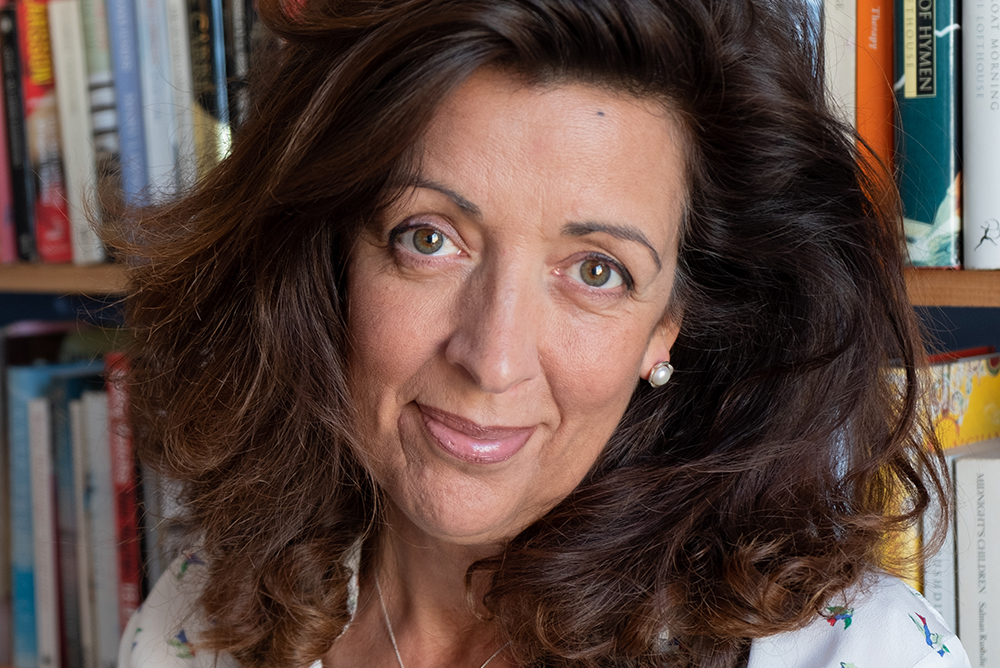Bringing you top new fiction picks, author interviews, discounts and lots more book chat, the Edition Book Club is a partnership with Cambridge Literary Festival and Heffers
Platform Seven by Louise Doughty
This gripping supernatural novel from the author of Apple Tree Yard is set against the backdrop of Peterborough railway station
Words by Charlotte Griffiths
Anyone who frequently travels by train in this region will be all too familiar with the charms of Peterborough Railway Station. Having to swiftly switch services or spend hours huddled on the platforms waiting for a connection is a regular part of the experience for an East-based rail-user – so it may come as a surprise to many of these travellers to learn that Platform Seven, the new novel from writer Louise Doughty (author of multiple bestsellers including smash-hit BBC adaptation Apple Tree Yard) is set almost entirely at the somewhat unprepossessing transport hub.
The book is narrated by Lisa Evans, a young woman in her thirties, who we meet on Platform Seven at 4am when she witnesses what appears to be a death by suicide – made all the more tragic by the swift revelation that Lisa died in the same spot, and is narrating the tale as a ghost. The opening scenes of the book were what initially came to Louise as the idea behind the entire story. “I knew immediately that Lisa was a ghost, and that she was trapped at the station,” Louise says, “and I knew that there would be a difficult relationship in her past, and that it would involve some sort of coercive control.”
 With the original idea firmly in her mind, Louise set about creating a world for her main character to inhabit – a challenge the writer rose to with relish. “The first thing you have to decide is: ‘what is your ghost capable of?’” she explains. “Are they a poltergeist? Can they move objects? Because if they can, then they can communicate with the outside world, and that raises all sorts of issues – so I decided straight away that my ghost was not going to be able to communicate in that way. I wanted her to be the omniscient narrator of the lives and loves of other people on the railway station – it’s a complicated narrative style that lives in other people’s heads as well.” Being omniscient gives Lisa access to the thoughts, feelings and emotions of people passing through the station, but also those employed by the railway: the characters in uniform are often found centre stage in the book, both driving the narrative onwards and revealing so much of themselves in beautifully drawn vignettes.
With the original idea firmly in her mind, Louise set about creating a world for her main character to inhabit – a challenge the writer rose to with relish. “The first thing you have to decide is: ‘what is your ghost capable of?’” she explains. “Are they a poltergeist? Can they move objects? Because if they can, then they can communicate with the outside world, and that raises all sorts of issues – so I decided straight away that my ghost was not going to be able to communicate in that way. I wanted her to be the omniscient narrator of the lives and loves of other people on the railway station – it’s a complicated narrative style that lives in other people’s heads as well.” Being omniscient gives Lisa access to the thoughts, feelings and emotions of people passing through the station, but also those employed by the railway: the characters in uniform are often found centre stage in the book, both driving the narrative onwards and revealing so much of themselves in beautifully drawn vignettes.
These sections are deeply affecting to read: we all people-watch at stations and imagine the lives of fellow passengers, yet it’s rarely the workers who feature in these daydreams – Platform Seven turns a well-deserved spotlight on to the hopes and dreams of railway staff. Louise was keen to give this group a ‘proper dignity’.
“I do believe very passionately that those lives have the right to be written about with the same complexity, density and psychological subtlety as the lives of people who run art galleries,” she says. “If there’s a passionate belief in my work, I think it’s that: the democratising belief in the seriousness of the lives of these people. You have the cliche that people who work on stations are jobsworths: of course they’re not, they’re complex human beings just like everyone else.”
Setting the story at a station did raise literary challenges, as well as opportunities. “The big question of course, when you have someone who’s died at a railway station, is ‘did she fall or was she pushed?’ – and the mystery of her death,” Louise says. “I knew that I didn’t want her to die by suicide, but it’s incredibly difficult to murder someone at a railway station because of all the CCTV. And when you set up a central question like that in a book, you’ve got to answer it in a way that’s simultaneously surprising and inevitable: you’ve got to make your reader go: ‘Oh gosh! Oh – of course,’ almost in the same breath. And that’s difficult.”
I believe that those lives have the right to be written about with psychological subtlety
Louise also enjoyed the idea of writing a ghost story which wasn’t set in a Victorian house, and instead places the spirits in a modern, more commonplace environment. “A lot of people know that place so well – the number of people who now send me screenshots saying, ‘Oh my God, I’m passing through the station!’” laughs the author. “And if ghosts really existed, why wouldn’t they be there? They wouldn’t restrict themselves to floating around in white nighties – they’d be everywhere.”
Writing a novel set on Peterborough station did have its positives in real life, as well as within the narrative: Louise lives near Kings Cross, so nipping up to research on location was relatively straightforward. In the book’s acknowledgements, Louise mentions Room 132 at the Great Northern Hotel in Peterborough, where she spent many nights researching and writing the novel. “You can see the train platforms, the British Transport Police building and the multistorey car park: if you open the window, you can listen to the announcements, too. It’s not every novel where you can do your primary research while eating an excellently cooked breakfast in bed,” she writes in the book. “I’m aiming for a plaque in that hotel room,” she laughs when asked about the acknowledgement.
“I’ll be very upset if I don’t get one. Though a copy of the book in the room might freak out some of the guests! I could have just done day trips to Peterborough, but because I have a family and a very full household, I often went up for several days at a stretch so that I could get lots done,” she explains. “I’d walk around Peterborough, spend a lot of time on the station: luckily I had befriended the British Transport Police, otherwise people would have been calling the cops on me a lot, as I was hanging around looking a bit suspicious…”
Louise would get up in the morning and work in the room – always starting writing with the first coffee and avoiding email until lunchtime, if possible – then exploring Peterborough to research the answers to questions raised by her writing. “I’m a great believer in going on location to write a novel: I do that as much as possible, wherever the novel is set. I did spend some nights on the station as well – one freezing November night I was there in my fingerless gloves, my parka and my beanie hat – ‘bag lady with laptop’ was the look. I also went out on patrol with the British Transport Police, around the freight depot, shining torches around. There’s just no substitute for that kind of research. Get away from your desk, go out and find the book,” she says.
Some books are more fun to research than others. “With Black Water, I was walking the rice fields of Bali at dawn – with this one, I was on Peterborough Railway Station at 4am. And there was a moment when I thought ‘Mm, I think I’ve got this wrong: my next novel’s going to be set in Tahiti,” laughs Louise.
One for regular train-users and any readers who enjoy gripping, emotionally charged reads, Platform Seven is an unforgettable tale of relationships, love and loss – and it will certainly make you look at Peterborough Station in a completely different way.
IN ASSOCIATION WITH

Look out for the Cambridge Edition book club stickers in Heffers and get money off our monthly pick. Heffers is at 20 Trinity Street, Cambridge Blackwells.co.uk

